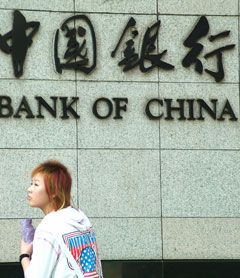Interest tax bill passed; special T-bond issuance approved
By Dong Zhixin (chinadaily.com.cn)Updated: 2007-06-29 16:14 The negative interest rate is encouraging a massive diversion of bank deposits to the equity market, which has soared 50 percent so far this year after a 130 rally in 2006.
China's household deposits posted the largest monthly drop in May, decreasing by 278.4 billion yuan, according to central bank statistics.
The central bank has raised interest rates twice this year and is widely expected to announce two more hikes before the end of year.
China started to collect interest tax in November 1999 in the wake of the 1997 Asia financial crisis in a bid to boost domestic consumption. But that aim has largely failed due to the lack of an eligible social security network in the country.
Bond sales
 A pedestrian wallks past a Bank of China branch in Shanghai May 21, 2007. [newsphoto] 
|
The ministry could sell the bonds to the central bank in exchange for the foreign exchange reserves now held on its balance sheet, with few implications for the economy.
But if the bonds are sold to the inter-bank market, it will take much longer to raise the funds and will have bigger economic implications.
The latter case is more likely to happen, China Business News quoted sources as saying.
Also unknown is the timing of the bond offer. Some predict that it will kick off in July as the State Forex Investment Company will complete registration in August and start operations the next month, according to the newspaper.
On whether the bonds will be sold in one time or in several batches, the sources expect issuing the bonds in phases, which will have much smaller impact on the financial market.
In a briefing to the lawmakers on Wednesday, finance minister Jin Renqing said the special bonds will be tradable and have maturities of at least 10 years. The market will decide the coupon rate.
Finance professor Zhong Wei of Beijing Normal University foresaw a major fluctuation of the financial market caused by the sale, according to the China Business News report.
The excess reserve rate in the country's banks stands at just one percent after the central bank ordered the lenders to set aside more money as reserves, five times so far in 2007, he explained.
Earlier this year, China decided to set up the State Forex Investment Company
to make more profitable use of its huge forex reserves which hit US$1.2 trillion
by the end of March.
 | 1 | 2 | 3 |  |
(For more biz stories, please visit Industry Updates)
